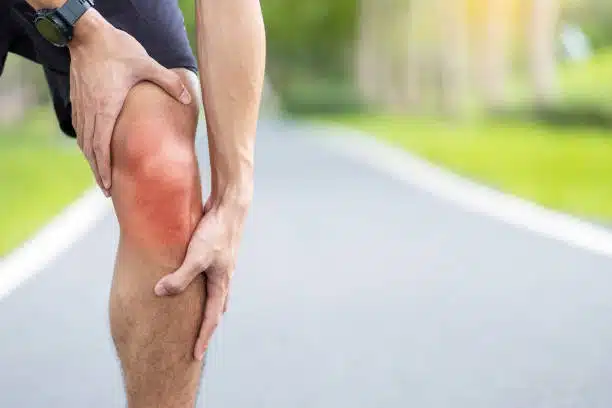
Do you feel pain in your knee while running or jumping? Do you find it hard to extend your knee? Does your knee pain worsen when you squat or walk downstairs? If so, you may have knee tendinitis – a sports injury that commonly affects elite athletes at the height of their game.
Also known as jumper’s knee and patellar tendonitis, knee tendonitis is when a thick band of connective tissues connecting the patella and tibia becomes irritated and inflamed.
Symptoms like redness and swelling of knee tendonitis may limit your sports-related activities or even keep you from doing your daily activities.
Let’s talk about common treatment options available to cure your knee tendonitis and which one is the best option for you.
Treatment Options for Knee Tendonitis
Typically, knee tendinitis gets cured on its own by rest. Plus, to relieve symptoms of tendonitis like pain and swelling, you can apply ice to the affected knee joint for at least 20 minutes 4 to 6 times daily.
Some other treatments that can help cure knee tendonitis are:
Medications
Pain and inflammation related to knee tendonitis can be treated using non-steroidal anti-inflammatory drugs (NSAIDs) that you can get from your nearby pharmacy without any prescription.
If your knee pain does not respond to oral over-the-counter anti-inflammatory drugs, cortisone injection around the knee joint may be an option.
Physical Therapy
Seeking a physical therapist for your knee tendonitis is a good idea. A physical therapist may guide you to do some special stretches and strengthening exercises to eliminate your symptoms and get you on the road to recovery.
In addition to teaching stretching and strengthening exercises, a physical therapist may also recommend you wear a patellar tendon strap (a strap that can help with knee tendonitis by distributing pressure away from the tendon) and consider iontophoresis (a therapy in which electric current is used to push corticosteroids through your skin).
Surgery
Even though rare, in some cases where tendonitis symptoms do not improve with traditional treatment options and where imaging tests show a tendon tear, your orthopedic surgeon may recommend you knee surgery to treat patellar tendonitis.
Surgery is performed using an arthroscope – a device with a tiny camera – so you can have a shorter recovery period and return to the field sooner.
What is the Best Treatment Option for You?
At the early stage of knee tendonitis, taking rest from the activities that caused tendonitis or may aggravate it is the best option for you.
With the rest, you can also take some over-the-counter painkiller medications to treat pain and inflammation. You should see an orthopedic surgeon for thorough evaluation and treatment if your pain and swelling do not subside with rest and medications.
Your orthopedic surgeon will not use a cookie-cutter approach to treat your issue but will work with you to determine the treatment option most suited to your need.
To decide on a treatment option for you, they may do an assessment to consider the extent of damage to your knee tendon, the severity of your symptoms, the frequency of your symptoms, etc. Typically, an orthopedic surgeon recommends conservative treatment before turning to surgery.
So, the best option for you is the one that is according to the current state of your knee tendonitis.
Knee Tendonitis Treatment in Bismarck, ND
If you are a sportsman and often have pain in your knees, you may have a knee problem, such as a jumper’s knee or knee tendonitis.
Our board-certified orthopedic surgeons and sports medicine doctors at The Bone & Joint Center have extensive experience in making a diagnosis and providing treatment of sports injuries and musculoskeletal problems, including knee tendonitis. Our providers offer the best services and guidance not only to treat your musculoskeletal problems but also to allow you to get back on track and play your favorite sports.
For an appointment, feel free to call us at (701) 946-7400 / (866) 900-8650 or fill out our online request form.

